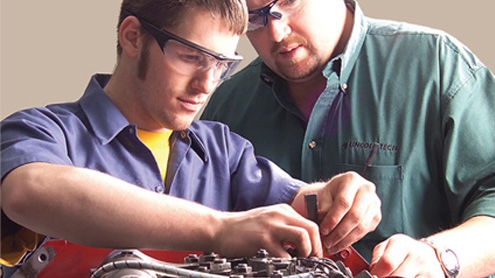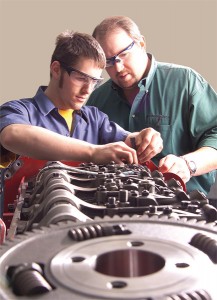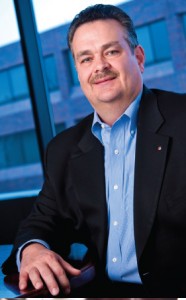
By David Hubbard

Advanced electronics and digital technology is the new order for 21st century vehicle maintenance. Today’s bus and coach technicians must be as adept at reading data sensors as they are dipsticks as the laptop and diagnostic software has evolved into the principle tools. Hybrid propulsion systems, multiplex monitors, electrification and energy storage, all designed for safety, efficiency and less stress on the environment, stretch the scope of the technician’s skill set. The new maintenance protocol foresees and diagnoses the problems and fixes it before it breaks.
Training modern shop technicians to ensure safety, smooth trips and a profitable bottom line requires comprehensive and complex curricula that empower new entrants with the information and skills unheard of even five years ago. Today, as maintenance moves closer to science, maintenance technicians need to be familiar with analytics, multiplex systems and logic charts.
The word from the industry is that this new protocol is thinning the employable ranks, while further advancements and updates will only come quicker. The future requires more highly technical training that only comes through industry-wide certified training programs readily available from OEM service representatives, vendor and suppliers certification training and established apprentice programs that lead to ASE certification. But few are as comprehensive as the full-term training specialized for heavy-duty vehicles a technical institute provides. Nonetheless, from an employer’s perspective, every training resource combines to create the fast track in identifying qualified candidates with the requisite skills to repair and maintain today’s complex bus and coach fleets.

The modern fleet is in a continual state of change and anyone with the information and skills to keep them rolling is in high demand. The challenge to all maintenance directors in both public and private transportation arena is to find and hire and retain the individuals who can bring the solutions.
Rudy Woodward, vice president, Technical Services for Veolia Transportation, Chicago, IL, and Lee Loper, vice president and GM, ABC Companies, Midwest Region, speak for the public transit and private coach industries respectively in their promotion and encouragement of ASE training and certifications necessary to stay abreast of the changes.
“Because of the equipment it was much easier to fill maintenance positions years ago,” says Woodward. “The average mechanic could fix about anything with a crescent wrench and Phillips head screwdriver. Today the minimum requirements to even get a foot in the door require a far greater knowledge of electronics and advanced diesel technology”
This may come as good news for job seekers with formal training in diesel technology. “It is very difficult to find the individuals who have invested personally in ASE certification and technical training that add value to their employment potential,” says Loper. “Aside from mechanics who can do the basic mechanical work, the tech savvy person who knows how to work off a laptop and study vehicle history to arrive at the correct diagnostics saves us and our customers time and money. We consider him a valuable asset to the company.”

Unfortunately, say Woodward and Loper, not every new hire comes through the door carrying the credentials and certificates of an A-level journeyman technician. They stress the importance of company-sponsored training programs that streamline the hiring process through internal developmental programs.
They both maintain the traditional C- B- and A-level apprenticeship approach to ASE certification is the foundation of maintenance training throughout public transit and larger private transportation enterprises.
“It is very difficult to find the individuals who have invested personally in ASE certification and technical training that add value to their employment potential,” says Loper. “Aside from mechanics who can do the basic mechanical work, the tech savvy person who knows how to work off a laptop, run through the systems, study the vehicle history and come up with the correct diagnostics saves us time and money, as well as for our customers, and is a valuable asset.”
Woodward and Loper are not alone in their wish for every maintenance employee they hire to be so qualified. They know this is not the real world.
On the same hand, both concur that it is just as unrealistic for a recruit fresh out of a technical school or a mechanic with a handful of OEM certifications to expect to step into a top paying position.
The key for both the job seeker and the employer hinges on how they approach that first job.
“To perform successfully on a daily basis in a shop environment is a difficult transition for most,” says Woodward. “The workload is never as controlled as the classroom, and the job requires thinking on one’s feet with regard to scheduling and emergencies that can only come with experience.”
To best serve its network of client transit agencies, Woodward says Veolia Transportation is doing all it can to make the entry-level positions more inviting for Class C apprentices.
“Our recruits may be younger graduates of a technical institute, diesel training program or automotive courses from a community college, or experienced mechanics seeking further growth in their careers,” he says. “We want to send a signal to these individuals that our company offers plenty of opportunities for advancement.”
According to Woodward this plan at Veolia is ultimately a long-term growth process.
“Once an entry-level employee is on board as a member of our team, our intent is to grow the quality of that individual’s knowledge and skill through our internal training program,” he says. “We believe in a few years we will then have the A-level journeymen we are seeking.”
He says the biggest advantage to this internal employee development is the very transit-specific training and experience they gain throughout the entire process.
At its facility in Nappanee, IN, ABC Companies is under contract with Greyhound Bus Lines to refurbish and update the older vehicles in the fleet. In its first year, the company has already delivered 255 completed vehicles.
The company also operates a nearby full-service coach maintenance facility for all operators. Loper says a great number of new hires to either operation come from the trucking industry, and regional delivery services where the economy has taken a toll.
“Hiring for the Greyhound project is less complex, as the tasks for each mechanic is more narrowly-defined within the overall refurbishment process, such as engine and transmission, chassis, brakes or interior appointments, and not cross-trained in other areas.”
Veolia Transportation manage operations for public transit authorities and private bus companies both say they struggle with hiring and retaining qualified maintenance personnel in light of competing industries that can offer higher pay.
According to Loper, it is important to sell the unique aspects of the bus and motorcoach industries, emphasizing the opportunities and challenges specific to vehicles and operations responsible for carrying passengers as opposed to freight and cargo. BRM
